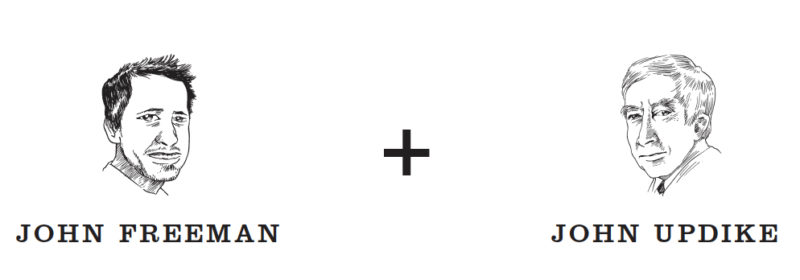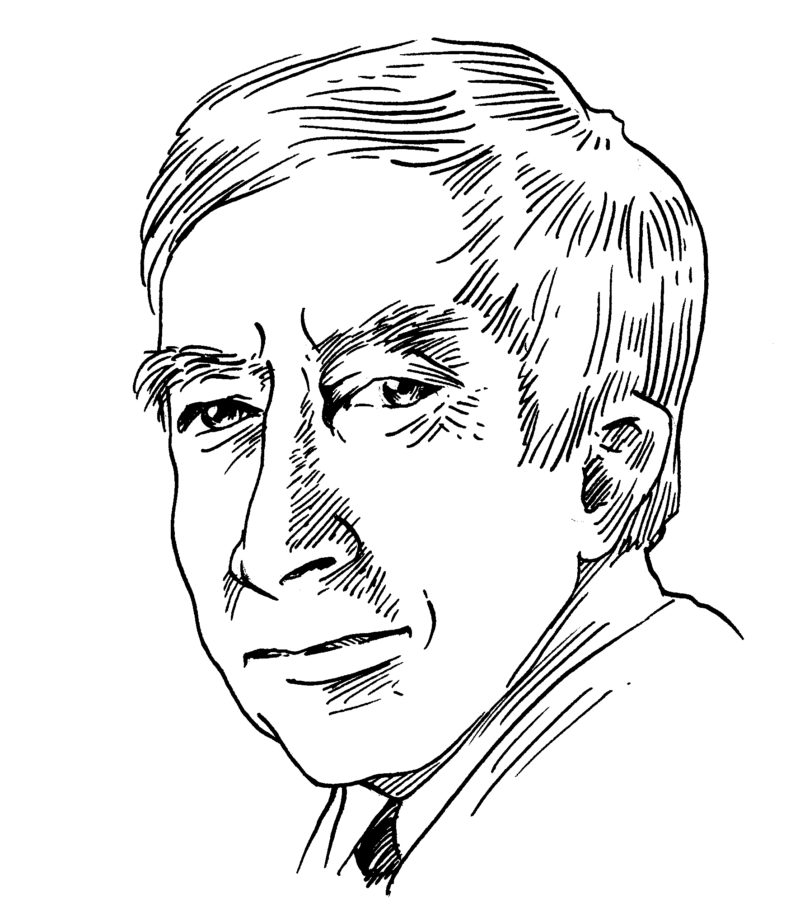
My first apartment in New York was a flat in a Brooklyn brownstone owned by a magazine editor and her silent, bookish husband. I spent a lot of time before a long, dusty bookshelf that ran parallel to the staircase in their home. To get a volume from the “F” section, you had to climb halfway up the stairs and lean out over the banister. One day, the silent, bookish husband caught me craning over the ten-foot drop, Flaubert’s Sentimental Education in my hands. Suddenly he became talkative. He told of disappearing into Proust over a teenage summer on Fire Island. How Tolstoy was a passionate college-age fling. A late reader, I envied his library and these lazy, literary summers. I asked him what I should read. First he pulled down a volume of short stories by John Cheever, then he gave me Rabbit, Run, by John Updike.
The Cheever I put down without finishing: the stories felt whiny and overdetermined, their broadcast mysteries hardly mysterious. But Updike was another thing. I blasted through Rabbit, Run in a few days, ferrying it into the city in a muggy trance. In college, I had fallen for Jack Kerouac—and the story of Sal Paradise and his love of the American road. Here was that book’s exquisite opposite—the story of a man who made himself a prison of small-town domestic life, a man whose big countercultural act was not to light out for the open highway, but to get in a car, drive across town, and sleep with his mistress.
I felt an instant connection with Updike’s fiction. I had lived in eastern Pennsylvania for six years as a child, and the region’s circumambient embrace felt like a third parent to me growing up. Now that I was an adult, I could see how such a life might have become stifling. In Updike’s prose, it was gorgeously so.
One book led to another, and before long, my Updike appreciation had turned to mania. I slowly amassed a complete set of first editions of his books—fifty in all—and my girlfriend Leslie, bemused and never smitten by Updike, often accompanied me to bookstores to get them signed. When I decided I, too, wanted to be a writer, I did what Updike had done forty years before me. I quit New York, and moved with my mate into a white clapboard house in New England. Leslie took a job in technology research, and I began to write. Only I didn’t. Instead, I spent my time reading Updike, increasingly aware that at my age he had published a volume of light verse and a short novel, but also more and more conscious of his work’s magnificent sadness—of the families broken up and destroyed, the repetitive failure of fleshly desire to relieve his characters’ creeping claustrophobia. At night, I would occasionally look at the shelves in our bedroom and worry they might collapse from the black weight of their content, smother us in our sleep.
During the daytime, though, the air would clear and my growing shelves of Updike titles became, again, a beacon. His industry and mindfulness of every detail of the visible world—so prevalent in even the soggiest of his novels—was my M.F.A. If Updike himself functioned as my model for how to behave as a writer, his characters—whose lives mine increasingly resembled—were the anti-models of how to behave as a person. Through the repetition of reading, I thought, I might avoid the relationship immolation his characters provoked, again and again and again.
Or so I thought. I took a job abridging Tarzan of the Apes for a children’s publisher. It occurred to me that what I had been doing with Updike was similar to this grim bit of hackery, tracing my life over that of another writer’s. My personal life suffered equally from my attempts at mimicry. At the end of the workday, as the New England chill settled below the rafters, Leslie and I would snip at each other with increasing frequency and rancor. I was unhappy because I wasn’t writing; she was unhappy for reasons I didn’t quite understand. Even though we were only in our mid-twenties, a sense of opportunities lost began to hover.
After a year living among couples twice our age, Leslie and I had had enough. We moved back to New York. Away from the predetermined doom of our Updikeian stage-set of a life, we felt our sense of possibility recharge. I decided to propose, which meant I needed a ring. For the last time, I turned to Updike. I had gone through periodic purges of my shelves, attacking my bibliophilia like a vine. But it always grew back, often thicker and more unruly. This time, however, I chopped down the largest tree in my forest—my Updike collection itself. It took three cab rides, but in a few hours I’d managed to transport all fifty-one books to a New York dealer.
Traveling down Park Avenue in a cab a week later, a little red leather box nestled in my lap, I felt purged and absolved. All the heartache and the wisdom and weakness I’d absorbed through those books had been boiled down to something eternal, and pure: a wedding ring. No longer would the spines of those books stare out at me in my sleep in judgment and gloom. I was free to become the husband I wanted to be, the writer I was meant to be—whatever that meant. I had swallowed Updike whole and spit out the bones.
*
I was surprised by how quickly things fell apart. A year after we were married, my wife moved out. When times were bad with Leslie, I had fantasized about living alone, like a young Updike, writing in my garret. Now I had a place all to myself and I filled it with cigarette butts. As I looked out the window and smoked, I often thought about all the Updike books I had read in the past ten years and how witnessing his fictional marital breakdowns seemed to have done me so little good. Studying his books had made me a better writer and a critic, but I made the same life mistakes his characters did.
We got divorced in the fall. Leslie had moved to California, and the laws of Maine—where we had married—required one of us to be present during the final divorce proceedings. I drove up from New York alone, and spent the night with my soon-to-be ex-in-laws in their house on the beach, eating the most uncelebratory lobster dinner I have ever eaten. The next morning I drove to the court with Leslie’s mother, who waited outside the empty chambers while I cut the thin legal string that still connected me to her daughter.
I didn’t drive directly home. That afternoon, by a fluke of scheduling, I had arranged to interview John Updike at the Museum of Fine Arts, Boston. He had just published a collection of essays on art called Still Looking, and the interview conceit was that we’d wander among the paintings so he could riff on art in real time. It was not my first time meeting him in an interview context. Four months after my wedding, I’d interviewed him about his twentieth novel, Seek My Face. I’d been dazzled by his gentle but colossal intelligence, relieved to be able to treat him as an interview subject rather than the living embodiment of an abandoned dream.
I got lost on my way to the museum and arrived late. I discovered Updike waiting by the foyer, dressed in khaki slacks and a sport coat. Just over seventy years old, he had a full head of hair and the coiled physical presence of a man in good shape. We passed through a few galleries, Updike dispatching prose poems of appreciation with chummy good humor—as if surprised by how easily his mind created verbal felicitations with language. At some point I began to flag, however, because he turned to me and said, “Is this enough? I mean, you look pretty tired. I understand you are coming from Vermont?”
I told him it was not Vermont, but Maine, and in response to his question about what I was doing up there said, “I was getting divorced.” The interview came to a dead halt. Updike turned to me with real feeling, his ironic pose collapsing. “I’m really sorry,” he said. He would not allow me to make light of my newly minted divorce, said that he had gone through this once before too, which I knew, and that it was hell. His advice continued, briefly, but it was so surreal to hear him reference his private life that today I can hardly remember what he said.
Apparently, though, he remembered. When Terrorist, his most recent novel, approached publication, a newspaper asked me if I could once again speak to John Updike. I called his publisher and was put on a junket schedule, then bumped, and bumped again. Finally I got through to his publicist. He switched from speakerphone to handset.
We got some mixed feedback from John on the last conversation, the publicist explained. My ripped jeans and two days’ growth might have been noted, my midinterview explosion of personal detail—which I remembered as more of a leak—had possibly made John feel uncomfortable. I had to understand, John was of the old school.
I didn’t know what to say. At first I was hurt, embarrassed, but soon I became more circumspect. If I hadn’t known before, I knew now: it was a breach of everyone’s privacy when a reader turns to a writer, or a writer’s books, for vicariously learned solutions to his own life problems. This is the fallacy behind every interview or biographical sketch, to tether a writer’s life too literally to his work, or to insist that a novel function as a substitute for actually living through the mistakes a person must actually live through in order to learn how to properly, maybe even happily, survive.
I convinced the publicist to let me go ahead with the assignment. The conversation went well. We sat in a conference room so high up over midtown Manhattan it was like riding in a helicopter. In between bites of a turkey sandwich, Updike described what he saw on 9/11. I wore my nicest suit, the one I got married in. I did not mention this fact to Updike, and just once did I interrupt the snowfall of his verbal prose poems. It was a perfect Updike moment—powerful and discrete, only the littlest bit surreal. He would have nothing to do with its shaping or its meaning, either to my fiction or my life. That would be up to me.





